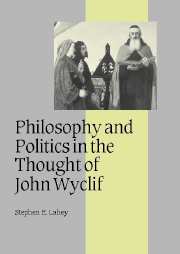Book contents
- Frontmatter
- Contents
- Acknowledgements
- Abbreviations
- 1 The historiography of Wyclif's dominium thought
- 2 Why dominium?
- 3 Wyclif's realism and divine dominium
- 4 Proprietas in Wyclif's theory of dominium
- 5 Iurisdictio in civil dominium
- 6 On kingship
- 7 Conclusion
- Bibliography
- Index
- Cambridge Studies in Medieval Life and Thought Fourth series
7 - Conclusion
Published online by Cambridge University Press: 30 July 2009
- Frontmatter
- Contents
- Acknowledgements
- Abbreviations
- 1 The historiography of Wyclif's dominium thought
- 2 Why dominium?
- 3 Wyclif's realism and divine dominium
- 4 Proprietas in Wyclif's theory of dominium
- 5 Iurisdictio in civil dominium
- 6 On kingship
- 7 Conclusion
- Bibliography
- Index
- Cambridge Studies in Medieval Life and Thought Fourth series
Summary
So far we have explained Wyclif's thought on divine and human dominium to show both how the two are connected with one another and how they are founded in his realism. The metaphysics of the Tractatus de Universalibus form the basis for the cosmological, social, and ecclesiastical arguments of the first books of the Summa Theologie. Earlier interpretations of Wyclif's thought have either denied connections between Wyclif's realism and his political thought or suggested that the tenor of the political thought indicates a likely abandonment of his realism. It will help, however, if we explore several possible alternative readings aside from the earlier interpretations, to be more certain that our reading is a viable alternative to the earlier approaches.
In place of interpretations of the universal–particular account of civil dominium, Wyclif might have had the theocratic model of kingship in mind, in which the secular lord is the sole rightful holder of all temporal authority, acting as God's intermediary on earth. But on most versions of this model, the king's sovereignty is absolute; in Wyclif's thought, the depiction of dominium as a reciprocal relation with the lord's subjects forestalls such relatively complete authority. Such a theme is not as immediately evident in the theocratic model. We might also think that Wyclif's theory was patterned on a secular hierocratic scheme, in which the king replaces the pope at the summit of an earthly hierarchy of power imitative of the celestial hierarchy.
- Type
- Chapter
- Information
- Philosophy and Politics in the Thought of John Wyclif , pp. 200 - 224Publisher: Cambridge University PressPrint publication year: 2003
- 1
- Cited by



